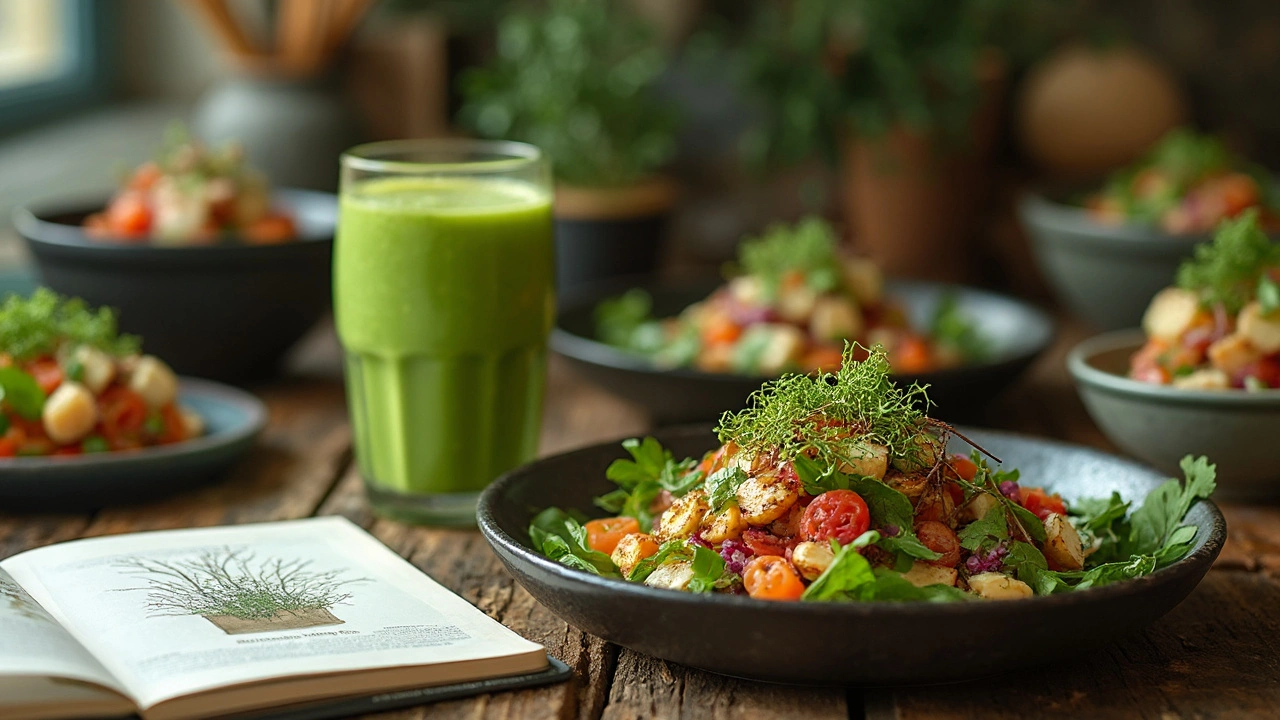If you think about dietary supplements, duckweed probably isn't the first thing that comes to mind. But here's the kicker: this little aquatic plant is packed with nutrients that could seriously punch up your diet. Known for growing on ponds and lakes, duckweed is full of proteins, fibers, and good stuff like Omega-3s and vitamins.
Why are people so excited about duckweed? Well, it turns out that it might just be one of the most eco-friendly foods out there. It grows incredibly fast, so we're not talking about something that takes years to cultivate. Plus, it doesn't need fertilizers like traditional crops. More nutrients, less hassle—that's a win-win!
So how does this tiny plant benefit you? With a surprisingly high protein content, duckweed can be a great alternative for those looking to reduce meat consumption but still want to keep their protein levels up. It's almost like finding a plant-based jackpot right in your backyard pond. And the health perks don't stop at protein; think vitamins A, B, and even C, making it a multi-tasking supplement you might just want to consider.
- What is Duckweed?
- Nutritional Benefits
- Health Impact
- Sustainability Factor
- Incorporating into Your Diet
- Potential Challenges
What is Duckweed?
So, what exactly is duckweed? This little green gem is the smallest flowering plant on Earth. It's that tiny floating green blanket you might have seen covering a pond or lake. Despite its size, it has a big impact. Duckweed belongs to the family Lemnaceae, and you can find it almost anywhere there's still or slow-moving fresh water.
One of the amazing things about duckweed is its growth rate. It's like the rabbit of the plant world—fast and persistent. It can double its mass in just 24 hours. That makes it not only a great piece in the puzzle of sustainable food sources but also a plant scientist's dream for studying rapid growth models.
It's often overlooked, but duckweed is a bit of a nutrition powerhouse. To put it into perspective, scientists have found it to be made up of up to 45% protein. That’s higher than some of the more common plant-based protein sources like soybeans.
But protein isn't the only good thing packed into this tiny plant. It’s rich in other essential nutrients, including essential fatty acids like Omega-3s, which are crucial for heart health. And let's not forget about the load of vitamins—like Vitamin A and the B-complex group. When it comes to micronutrients, duckweed punches well above its weight.
Over the past few years, there's been a buzz around using duckweed as a dietary supplement. Given its nutritional content and rapid growth, it's no wonder that researchers and nutrition enthusiasts are paying attention. It offers the potential not only for improving personal health but also for addressing larger-scale environmental and economic sustainability challenges.
Nutritional Benefits
When it comes to unlocking nature's secret stash of nutrients, duckweed might just be the ace in the hole. This tiny plant is surprisingly rich in protein, boasting nearly 40% protein content—rivaling some of the best plant-based sources out there.
You’ve got vitamins, and then you’ve got duckweed-level vitamins. This little guy packs in vitamins A, B, and C, alongside essential minerals like calcium, magnesium, and phosphorus. That's a whole lot of nutritional punch in a small package!
For those keeping a closer eye on their diet, there's no need to worry about carbs throwing off your balance. Duckweed is lightweight on carbs, making it a great supplement for anyone looking to up their nutrient intake without the extra calories.
- Protein Powerhouse: Approximately 40% protein content makes it a fantastic source of plant-based protein.
- Rich in Vitamins: Includes vitamins A, B, and C to help bolster your immune system and overall well-being.
- Minerals Galore: High in calcium, magnesium, and phosphorus, supporting bone health and energy production.
- Low Carb: Perfect if you're watching your weight or just want to avoid carb-heavy diets.
Here’s a bonus: duckweed contains Omega-3 fatty acids, which are usually found in fish and have been linked to a host of health benefits, like reducing inflammation and promoting heart health.
Given all these benefits, it’s no wonder duckweed is gaining momentum in the world of dietary supplements. It's like hitting the jackpot for your health!
Health Impact
You're probably wondering, "What's so special about duckweed that it packs such a health punch?" For starters, it has a high protein content, akin to those found in animal products, but from a plant source. That's a big deal if you're exploring plant-based diets or need a new source of protein.
Duckweed isn't just about protein, it's a nutritional powerhouse. It's rich in vitamins like A, B, and C which play key roles in keeping your skin, immune system, and energy levels in check. Plus, it includes essential amino acids, making it a brilliant addition to your diet for overall wellness.
Another feather in its cap is the Omega-3 fatty acids. These good-for-you fats are crucial for heart health and reducing the risk of chronic diseases. While most Omega-3s are sourced from fish, duckweed provides a plant-based alternative that's both accessible and sustainable.
Let's talk about antioxidants. Duckweed is flush with polyphenols, nature's way of helping you fight off inflammation and oxidative stress. This is huge if you're proactive about staving off chronic conditions and promoting long-term health.
And here's a fun stat for you: according to research, 100 grams of dry duckweed can contain up to 40 grams of protein, which could rival some protein-rich meals you're used to. Not bad for a plant, huh?
| Nutrient | Content per 100g (Dry Weight) |
|---|---|
| Protein | 40g |
| Vitamin A | 7500IU |
| Vitamin C | 29mg |
So, if you're aiming for a healthier life, duckweed might just be what you need. It's worth considering how this tiny plant can make a huge impact on your health. Whether you're into plant-based diets or just want an efficient, eco-friendly nutrient source, duckweed offers benefits across the board.

Sustainability Factor
When we talk about duckweed, one of its biggest selling points is its sustainability. Unlike many traditional crops, duckweed doesn’t require sprawling fields or excessive water resources to thrive. It grows on water surfaces, rapidly multiplying. This means it takes up less land and resources, giving it a tiny ecological footprint.
Duckweed isn't just speedy; it's a nutrient sponge. It’s excellent at absorbing nutrients from the water it grows in, which helps in nutrient recycling and can even improve water quality. Imagine reducing environmental waste while simultaneously growing a nutrient-rich food source—talk about killing two birds with one stone!
Here's a little fact that might blow your mind: duckweed can double in biomass every 24 to 48 hours. That’s like having a vegetable garden on fast-forward, producing more in less time. So when you're considering health benefits and environmental impact, duckweed stands out as a real game-changer.
Commercially, it's gaining attention because it doesn’t need the chemical fertilizers and pesticides that harm ecosystems. This means less pollution for our waters and soils. Plus, in a world where we're always looking to reduce carbon emissions, duckweed’s ability to grow efficiently with minimal energy makes it a truly green option.
| Aspect | Duckweed |
|---|---|
| Water Usage | Minimal |
| Growth Rate | Doubles in 1-2 days |
| Farm Land Required | Very low |
| Chemical Usage | None |
So, if you’re looking to make a positive impact with your food choices, incorporating duckweed might be the way to go. It’s a brilliant example of how we can feed ourselves while also being kind to the planet.
Incorporating into Your Diet
Adding duckweed to your diet is easier than you might think. Here's the thing: it's available in a variety of forms, from powders to supplements and even fresh in some places. It's not just a trend for the health nuts; it's practical for anyone looking to boost their nutrition.
If you're going for the dietary supplement form, you can find duckweed in capsules. These are simple to take and ensure you're getting a consistent amount every day. But if you like to control what you eat a bit more, powdered duckweed is a perfect versatile choice.
Using duckweed powder is where it gets exciting. You can sprinkle it on just about anything—salads, soups, smoothies, you name it. It has a mild taste, so it won't overpower your favorite flavors. Plus, you can't beat the convenience of stirring a scoop into your morning smoothie to kick-start your day packed with nutrition.
Looking for a full meal? Try making duckweed a part of your cooking. Think pasta, baked goods, or homemade energy bars. It adds a potent nutritional punch without changing the way you enjoy your meals.
- Start with half a teaspoon of duckweed powder in smoothies or juices.
- Use it as a topping for oatmeal or yogurt for a protein boost.
- Add to soups or stews towards the end of cooking for added nutrients.
And if you're feeling adventurous, some companies offer fresh duckweed. It resembles other leafy greens and can be tossed into salads or sandwiches. Just make sure it's fit for human consumption and properly cleaned.
Curious about trying it out? Remember, not every duckweed product is created equal. Check labels and sources to ensure you're getting top quality, whether for its claimed health benefits or its sustainability factor.
Potential Challenges
So, what's the downside to adding duckweed to your diet? While this aquatic plant has a ton of upsides, like most things, it comes with its own set of challenges. One of the main issues is its availability. While duckweed's been around forever in ponds and lakes, the challenge is in getting it from the water to your dinner plate.
And then there’s the taste. Not everyone is going to be a fan. Duckweed has a pretty mild, grassy flavor, which some folks like, but others might not. It's a bit of an acquired taste, and if you're trying to get the whole family on board, it might take a little convincing.
"The main barrier to widespread use of duckweed in diets is overcoming consumer hesitation." — Dr. Emily Galvin, Nutrition Expert
Safety is another big one. Because it grows in water, there's always the potential for contamination. It's really important to make sure your duckweed source is clean. You don't want to introduce any pollutants or toxins into your diet. To stay safe, it’s best to buy from reputable suppliers who test for safety.
- Nutrient Build-up: Duckweed absorbs nutrients from its environment. If it's grown in waterways with heavy metals or pollutants, it could soak up some bad stuff along the way.
- Seasonal Variations: It's subject to seasonal changes. In cooler climates, it may not grow as predictably as it does in tropical areas.
Finally, there's the question of digestibility. Some people find it a little tough on the stomach since it's so fiber-packed. So, it's crucial to start small when introducing it to your diet. Try adding a sprinkle to soups or smoothies and see how you handle it before diving in headfirst.





One comment
Sounds like another hype trend
It is bewildering how quickly society latches onto the newest fad without a moment's reflection. Duckweed may glitter with promises of protein and sustainability, yet it remains a mere pond plant. We must ask ourselves whether we are truly seeking health or merely chasing novelty. The allure of a green superfood can obscure the mundane reality of cultivation. Even the most noble intention is tarnished when profit drives the narrative. Many manufacturers obscure the sourcing standards, leaving consumers in the dark. A product that doubles in a day sounds miraculous, but nature's miracles are not always benign. The ecological footprint, while small, can hide hidden contamination risks. Water bodies polluted with heavy metals may transfer toxins to the harvested biomass. If we do not scrutinize the origin, we may ingest more than we anticipate. The moral imperative is to demand transparency from suppliers. We cannot excuse ignorance with the excuse of “it’s natural”. Simplicity in dietary choices does not preclude responsibility. Moreover, the cultural shift toward overconsumption of “miracle” foods undermines traditional nutrition wisdom. Let us not disregard centuries of plant knowledge in favor of a fleeting trend. Ultimately, the decision to incorporate duckweed should be guided by informed caution rather than blind enthusiasm.
Duckweed presents a fascinating bridge between sustainability and nutrition, and we should explore it without prejudice. Its rapid growth can alleviate pressure on land‑based crops, offering a pragmatic solution to food security. While concerns about contamination are valid, rigorous testing protocols can mitigate these risks effectively. I advocate for balanced research that weighs both benefits and potential drawbacks transparently. Consumers deserve clear data, and scientists must deliver it with integrity. Let us move forward together, harnessing this resource responsibly.
From a nutritional engineering perspective, duckweed’s high bioavailable protein fraction makes it an excellent candidate for fortification matrices. When formulating a supplement, consider synergistic inclusion with phytosterol‑rich carriers to enhance lipid assimilation. Its omega‑3 profile, predominantly α‑linolenic acid, can complement EPA/DHA sources in a lipid‑balanced protocol. Moreover, the low carbohydrate index aligns with glycemic control strategies for metabolic syndrome patients. Integrating duckweed powder into your daily shake can thus optimize macro‑and micronutrient density with minimal caloric load.
I understand the hesitation when encountering a new ingredient like duckweed, especially given concerns about taste and safety. It’s important to start with a modest dosage, perhaps a half‑teaspoon in a smoothie, and monitor how your body responds. Look for products that provide third‑party testing certificates to ensure purity and absence of heavy metals. Pair the supplement with familiar foods such as oatmeal or yogurt to mask any grassy notes while still reaping the nutritional benefits. Remember, gradual incorporation can lead to lasting habits without overwhelming your digestive system.
Honestly, that jargon sounds fancy but you could just say “add it to a shake”. It’s not that big a deal.
Thanks for the practical tip! I’ll definitely check for those testing certificates and start with a tiny scoop in my morning yogurt.
Interesting points! Do you think duckweed could replace some of my usual protein powder? 🤔